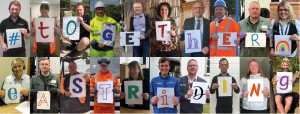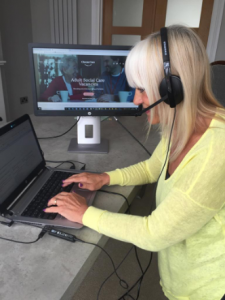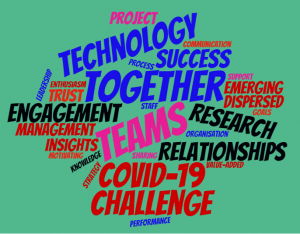The Concept
Covid-19 has turned our worlds upside down. The East Riding of Yorkshire Council had to react quickly to enable over 4,000 staff to continue to work from home. New IT systems had to be made available over night to allow office-based staff to continue to work as if they were at their own desks.
These very same challenges were mirrored across the country, both in the private and public sector. These were extremely challenging times, but the technology is only one element that enabled us all to continue to work. Without the resilience, resourcefulness and passion of staff, services would have failed through these difficult times.
The challenge now facing every organisation and individual is to understand how sustainable the current situation is. We all must ensure that the wellbeing of our staff is at the forefront of any future decisions being made on what the ‘new norm’ looks like.
Successfully being awarded the funding from MHCLG in response to our bid provided the perfect opportunity to work regionally to help us all ensure the continued wellbeing of the organisations we work for and the dedicated staff who work with us.
Our staff make our organisations, we must ensure their continued wellbeing, for our organisations to grow. This study will provide the research and tools to help guide us all through these challenging times. Kevin Woodcock, ICT Strategic Solutions and Systems Manager.

Our Staff
I’m a very social person and our team has always been a very supportive and caring team to work in so working from home would not be my first choice. However having experienced Covid-19 symptoms the week before lock down started I was already working from home when our team was tasked with setting up and running a ‘recruitment agency’ for the local Care Sector- in a week. This meant we had to leave all our other work and put all ‘hands to the pumps’. It was actually more like putting hands feet and our whole bodies to the pumps!

In a way this abrupt change of role made the enforced changes to working practices both worse and better.
Worse, because we were concerned about leaving our day jobs. Worse too because there was so little time to get to grips with something not tried before at the same time as using untested technology and with reduced social support and interaction. Most crucially we didn’t have time to process how we were coping with the emotional strain. We did all the right things with regular team meetings, 1-2-1’s and exceptional leadership but one by one the strain got to us, in varying degrees and in different ways.
The challenges were made better because we were doing something to help some of the most vulnerable members of our community and bolster the Care Sector at such a challenging time.
Better also because we got the opportunity to try out new practices. Yes it would have been great if we’d had more time to get it right before we began but we just got on with it and learnt and adapted as we went. These constant changes, and the high number of applicants meant that communication, no matter how we tried became a problem within our team and with other colleagues across the Authority and the Care Sector.
However in my opinion the aims of the trial were met due to the collaboration and willingness to make things happen by all concerned.
Was there a cost to my mental and physical resilience? The answer is yes. Would I do it again? Absolutely yes – as long as the learning from the trial (good and not so good) informs the way forward for Care Sector recruitment and as part of the Hull University research informs understanding of how changing working practices can affect our resilience levels. Carol Proud, Senior Organisational Development Officer
The Project Team
WOW!! How work and life has changed during COVID 19! Everyone has their own ideas on whether work / life is better, worse or the same . Change and speed of change in terms of where, how and when we work happened so fast, so planning went out the window. What has the impact of these changes been for the worker and their families and what should future work look like? The best way to find out the answers is to ask and listen to experiences of workers; thereby informing the way ahead, which is what this research is about.
When I heard about the project I was really keen to be involved as I have a considerable interest in employee wellbeing and soon discovered we all do. This has turned out to be a great opportunity to work with colleagues in my own organisation I do not normally meet and other partners in other local authorities and the researchers at Hull University. I have seen first-hand what can be achieved over a relatively short timescale when people with a common interest, pool resources and work together. I can’t wait to see the results and the impact on future work experiences! Sue Dixon, Occupational Health Manager



